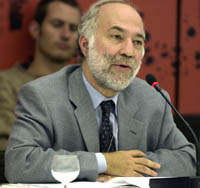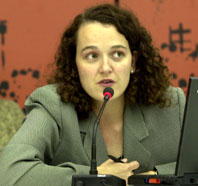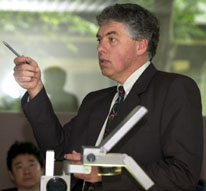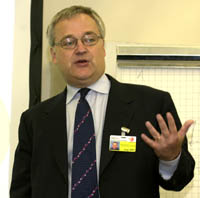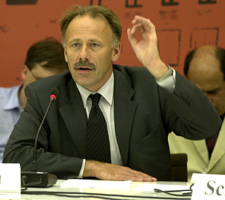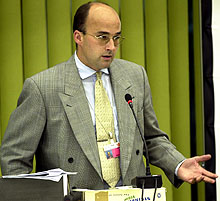|
|
|||||||||||||||||||||||||||||||||||
|
|||||||||||||||||||||||||||||||||||
|
Events convened on Friday, 20 July 2001 |
|
Transportation
in developing countries Presented by the Pew Center on Global Climate Change
Daniel
Sperling, University of California Davis' Institute for Transportation
Studies, emphasized that CO2 emissions from transportation
are growing twice as fast as emissions from other sectors,
and grew four percent annually from 1980-1998 in developing
countries. He explained that the Pew Center case studies projected
high and low GHG scenarios, conducted actual GHG emissions
analyses, and elicited conclusions and policy recommendations.
The case studies identified key strategies to address the
large increases in transport-related GHG emissions, including:
improving technology; managing growth in vehicle use; enhancing
and improving travel alternatives; coordinating government
land-use activities and infrastructure investments; and strengthening
local expertise and commitment to planning and management.
Jolanda
Prozzi, Cambridge Systematics, discussed the South Africa
case study. South Africa's transportation system has recently
become increasingly privatized, and there is good primary
inter-city road infrastructure, though motorcycles and bicycles
are rarely used. Transport accounts for 24 percent of total
energy use, with 41 percent of transport fuels derived from
coal and gasoline prices comparable to US prices. Prozzi stressed
the need for policies to improve accessibility and mobility,
restrain the use of private cars, and shift away from coal-based
fuels in order to reduce GHG emissions.
Ranjan
Bose, Tata Energy Research Institute, outlined Delhi's transportation
situation. Delhi has a large and rapidly expanding population,
very high vehicle ownership rates, an inadequate public transport
system, rapid growth in travel, increasing levels of congestion
and pollution, and uncoordinated management of urban land
use and transportation. He highlighted the need for future
policies and strategies to augment public transport, promote
the use of clean fuels, regulate traffic levels to reduce
congestion, promote non-motorized transport, restructure land
development patterns to reduce travel demand, and strengthen
institutional links, regulations and enforcement. Daniel Sperling presented the Shanghai case study on behalf of Hongchang Zhou, Tongji University, China. Shanghai has an extremely dense population, a strong economy, highly competent management, large investments in rail and road infrastructure, and exceptionally low private car ownership (with stringent disincentives). Transportation challenges for Shanghai include problems associated with increasing income, urban decentralization, and WTO membership, as well as gridlock resulting from increased travel, high densities and few roads. Motorization and GHG emissions from transportation will increase sharply, though significant potential exists to dampen the increase, as the difference between the high and low emissions scenarios analyzed is large. Sperling noted that if Shanghai can restrain motorization and GHG emissions, it could serve as a model for other cities. However, if its vehicle use, energy consumption and GHG emissions skyrocket as in the high emissions scenario, it will signal that restraint of transport-related GHG emissions will be virtually impossible in the developing world. Discussion: Participants highlighted: the potential for the CDM to address the transportation problems discussed; animals as a sustainable mode of transportation; ways to influence individual behavior related to transportation choices; bio-fuels; and the need for comprehensive and integrated urban planning and policies. More
information: Contact: |
|
Accounting for short rotation forestry Presented by the Australian Department of Agriculture, Fisheries and Forestry
Grant explained that the Protocol's accounting rules under Article 3.3 are not suitable for short rotation forestry in hotter climates, where forests grow on a seven to fifteen year rotation for pulpwood. He stated that perverse incentives will act as a financial penalty to those countries with significant areas of short rotation plantations, and noted that this would result in investors purchasing emissions certificates to offset debits. He called for a sub-rule on harvesting that would ensure that Parties receive no net debits from short rotation forest plantations harvested in the commitment period. He added that alternative proposals, such as the EU proposal on an Article 3.3 and 3.4 (additional activities) offset on deforestation accounting issues, does not address the accounting penalty associated with harvesting of short rotation forests. He concluded by emphasizing that the Australian proposal is consistent with the IPCC guidelines for short rotation forests as set out in the IPCC's special report on land use, land-use change and forestry. More
information: Contact: |
|
Insights from emissions trading in the UK and Germany Presented by the World Business Council for Sustainable Development (WBCSD)
Ingo Puhl, 500PPM, explained that a voluntary emissions trading system such as the Hesse pilot project requires incentives for participation, including banking and flexible rules for baseline selection and allocation. He noted that the transportation sector could participate in the Hesse emissions trading system, provided that data are collected centrally. He concluded that the benefits of emissions trading justify continuing practical efforts, and that the attractiveness of participation depends on the design of entry conditions. Lee Solsbery, ERM, announced that the UK emissions trading system has commenced. He stressed that the trading system is driven by tax-based pressures, rather than EU or UNFCCC/Kyoto Protocol requirements. He explained that intensive energy consumers in the UK are subject to emissions caps and targets, which they may negotiate against an 80 percent tax levy, and that it is cost efficient for companies to achieve their targets through trading. Solsbery noted that verification requirements for this trading system are strict with respect to boundaries, base-period emissions, accreditation processes, and third-party verification. More
information: Contact:
|
|
Climate change prevention creates jobs Presented by the German Federal Ministry for the Environment, Nature Conservation and Nuclear Safety (BMU) in cooperation with the German Federal Environment Agency
According to a new report, entitled "The Employment Impact of Climate Protection Policies: Study on behalf of the German Federal Environment Agency," investing in climate change prevention measures is cost effective in the long term. Jürgen
Tritten, German Minister for the Environment, Nature Conservation
and Nuclear Safety, said that job creation is an important element
of climate change prevention in Germany, particularly as its phase-out
of nuclear energy commences in 2003. He cited an estimate that
194,000 new jobs will be created through climate prevention programmes
by 2020. Stephan Wolf,
on behalf of Janina Scheelhaase, Prognos AG, presented findings
from the report, which illustrates that climate protection programmes
are not harmful to job creation. He illustrated that a 40 percent
CO2 emissions reduction scenario results
in permanent employment in the construction and energy sectors.
He said that changes in employment would take place primarily
in small and medium-sized enterprises and local economies. He
concluded that climate protection goals can be met without creating
job losses, and that positive synergy effects exist between environmental
and employment policy goals.
Perspectives on the German wind energy sector were presented by Claus Pescha, Enercon. He noted that changes in employment in the renewable energy sector include an estimated increase of two million new jobs in Europe. He emphasized that it is realistic to develop and invest in renewable technologies. More
information: Contact: |
|
Strategies for Kyoto and a study of proposed alternatives Presented by the Imperial College in collaboration with Climate Strategies
Michael Grubb, Imperial College of Science, Technology and Medicine and co-author of the "Keeping Kyoto" report, stated that the global community should ratify the Kyoto Protocol even without the support of the US, although he recognized that participation by the US and developing countries will be necessary in future commitment periods. He said the Protocol is fundamentally a good agreement, and the structure of developed country commitments is well-grounded in the Convention. He noted that the Protocol is a major achievement given the complexity of the issues. Highlighting several reasons for keeping the Protocol, he warned that a new alternative to the Protocol would not necessarily offer an improvement. He explained the report's conclusion that "keeping Kyoto" is politically feasible, and among the available alternatives, it provides the best prospect for achieving effective global action on climate change as part of a long-term strategy. Benito Müller, Oxford Institute for Energy Studies and co-author of the "Rejecting Kyoto" report, outlined two hypothetical alternatives to the Kyoto Protocol: emissions intensity targets, and price caps on emissions permits. He demonstrated that intensity targets are only good for countries that are experiencing economic growth. Müller concluded that intensity targets could work as a voluntary mechanism, but would not be an appropriate alternative to the Kyoto Protocol. Axel Michaelowa, Hamburg Institute of International Economics and co-author of "Rejecting Kyoto," explained that the price cap alternative was proposed to address certain industrialized countries' concerns that costs under the Protocol could be unacceptably high. He noted that although the price cap alternative appears intriguing, it involves serious implementation problems related to harmonization and banking. Naoki Matsuo, Institute for Global Environmental Strategies, stressed that keeping and developing the Kyoto Protocol would be far easier and more feasible than rejecting it and constructing a new framework. He noted that keeping the Protocol would enable the private sector to formulate forward-thinking strategies. More
information: Contact:
|
|
|
|
| The Earth Negotiations Bulletin (ENB) on the side is a special publication of the International Institute for Sustainable Development (IISD) in cooperation with the United Nations Framework Convention on Climate Change (UNFCCC) Secretariat. The Editor of ENB on the side is Kira Schmidt <kira@iisd.org>. This issue has been written by Emily Boyd <emily@iisd.org>, Fiona Koza <fiona@iisd.org> and Kira Schmidt <kira@iisd.org>. The Digital Editors are Andrei Henry <andrei@iisd.org> and Kenneth Tong <ken@iisd.org>. Photos by Leila Mead <leila@iisd.org>. Funding for publication of ENB on the side at COP-6 Part II is provided by the UNFCCC Secretariat. The opinions expressed in ENB on the side are those of the authors and do not necessarily reflect the views of IISD and funders. Excerpts from ENB on the side may be used in non-commercial publications only and only with appropriate academic citation. For permission to use this material in commercial publications, contact the Managing Editor at <kimo@iisd.org>. Electronic versions of these issues of ENB on the side from COP-6 Part II can be found on the Linkages WWW server at http://enb.iisd.org/climate/cop6bis/enbots/. | |
|
|
| © 2001, IISD. All rights reserved. |
|



